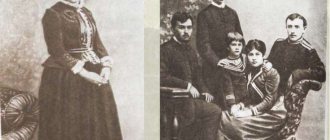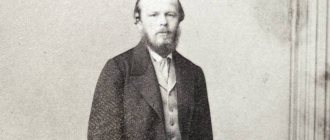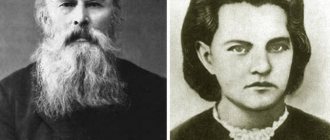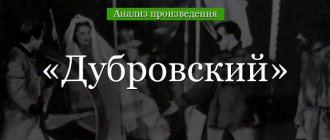About the product
The play “Profitable Place” by Ostrovsky was written in 1856. The relevance and topicality of the comedy is explained by its main theme - the identification and condemnation of bribery. The play is based on the impressions of the writer, who in his youth served as a scribe in court.
We recommend reading online a summary of “A Profitable Place”, step by step, which will be useful both for the reading diary and in preparation for a literature lesson.
The material was prepared jointly with a teacher of the highest category, Kuchmina Nadezhda Vladimirovna.
Experience as a teacher of Russian language and literature - 27 years.
The final
The play “Profitable Place” ends with an unexpectedly happy ending. Ostrovsky, whose genre is predominantly comedy, was able to show the social vices of our time even in humorous sketches. In the last, fifth act, Zhadov humiliatingly asks his uncle for a job, but in response, the latter, together with Yusov, begin to ridicule him for betraying his principles of living independently and by honest work, without stealing or taking bribes. Infuriated, the young man declares that there are honest people among his generation, abandons his intention and declares that he will not show weakness again.
Polina makes peace with him, and the couple leaves Vyshevsky’s house. The latter, meanwhile, is going through a family drama: Anna Pavlovna’s affair is discovered, and the offended husband makes a scene for her. In addition, he goes bankrupt, and Yusov faces dismissal. The work ends with Vyshnevsky suffering a blow from the misfortunes that befell him.
So, Alexander Ostrovsky (“Profitable Place” is a vivid example of this) in his works skillfully combined historical realities and sharp satire. The play we have retold can be offered to schoolchildren for a more in-depth study of the writer’s work.
Summary
Act one
The Vyshnevsky couple leaves the bedroom in the morning. Aristarkh Vladimirovich begins to reproach his beautiful young wife for her coldness and indifference towards him. He showers her with diamonds, gold and furs and often commits malfeasance. But even for the sake of rich gifts, Anna Pavlovna does not want to pretend.
Having received a love letter from an elderly married man, Vyshnevskaya at first wants to tear it up, but then decides to “show it to some of her friends and laugh together, it’s fun after all.”
Yusov, an experienced official serving in the department under his leadership, comes to Vyshnevsky. Soon Belogubov, Yusov’s subordinate, appears and is happy to learn that he was appointed copyist thanks to his good handwriting. Belogubov complains that he is not particularly good at spelling, which is why Zhadov, Vyshnevsky’s nephew, constantly makes fun of him. Yusov is indignant: “What is he himself? What kind of bird? Still laughing!
The officials begin to discuss Zhadov, who also serves in the department under Yusov, and, in addition, lives on everything ready with his uncle. But at the same time he does not show the necessary respect to the beneficent relative.
Zhadov appears and first of all goes to Vyshnevskaya to inform her about the upcoming wedding. His bride is poor, but this does not frighten Zhadov, who himself does not have a penny to his name. He is confident that Polina, if necessary, “will not show even a hint of displeasure,” and he will work tirelessly. However, his convictions do not prevent him from “asking for an increase in salary” from his uncle, for which he came to him.
Vyshnevsky comes out and begins to reprimand his nephew, who has become “the laughing stock of the entire office.” He assures that “it is better to be well-fed than to be a hungry philosopher,” and Zhadov’s pompous speeches, which he likes to read to clerks, are of no interest to anyone.
Having learned about his nephew’s upcoming wedding without a dowry, Vyshnevsky urges him to think first of all about the bride, for whom he is preparing “poverty, all kinds of deprivation.” He urges you to look “at life and service practically”, to restrain your obnoxious character, only in this case is he ready to help “with advice, and money, and patronage.” Zhadov refuses to live not according to his conscience. They part in the heat of a quarrel.
Vyshnevsky learns from Yusov that his nephew’s bride is one of the daughters of the widow Kukushkina. He asks to warn her not to give her daughter to Zhadov, who is capable of ruining the girl’s life.
Act two
In Kukushkina's sister's house, Polina and Yulinka discuss their suitors. Polina is passionately in love with Zhadov, while her sister can’t stand her fiancé Belogubov, but “she’s glad to marry him, just to get out of the house.” The girls' mother enters and begins to instill in them an important idea: husbands need to be constantly sharpened so that they bring more money into the house.
Yusov and Belogubov appear in the house. In a private conversation with Yusov, Kukushkina asks her future son-in-law for a position as chief of staff. The old official agrees, and at the same time warns her about the unreliability of Polina’s fiancé, Zhadov. But Kukushkina is sure that all the young man’s stupidities “come from his single life,” and he will certainly change after the wedding.
Left alone with her fiancé, Polina openly admits that she is poor and uneducated. However, Zhadov is even happy about this: he certainly wants to raise his bride himself. He declares his love to Polina and asks Kukushkina for consent to their marriage.
Act three
About a year passes after Zhadov’s wedding. He meets his good friend, teacher Mykin, in a tavern. Although he lives extremely modestly on a small salary, he does not complain about fate. He reproaches Zhadov for the fact that he, having no means, got married and thereby took on an unbearable burden: “one head is not poor, but even though it is poor, it is alone.”
Zhadov admits that he has absolutely no time to raise his wife, and she remains true to her old prejudices. But the worst thing is that she does not consider her husband smart, since “a smart person must certainly be rich.”
Yusov and Belogubov appear in the tavern in the company of two officials. The company celebrates a profitable business that brought Belogubov a big jackpot. The young official is extremely pleased. In a fit of complacency, he tries to treat Zhadov too, but he sharply refuses. Belogubov sincerely thanks Yusov, who taught him all the intricacies of bureaucratic manipulation.
Discussing matters in the office, Yusov teaches young officials: “Live so that the wolves are fed and the sheep are safe.” Having relaxed in the friendly company, he even decides to dance a little.
Belogubov again sits down with Zhadov and offers to “live like a relative.” He wants to help him with money, seeing the plight of his family, but only insults the proud Zhadov even more.
Act four
Polina sits in a poorly furnished room and is frankly bored. She is visited by Yulinka, who begins to brag about her husband’s successes. She is horrified by the conditions in which her sister lives, because “nowadays it’s common for everyone to live in luxury.” Yulinka is surprised “how money and a good life ennoble a person,” and cites herself as an example.
Polina can’t stand it and complains about her husband, who “keeps telling her to stay at home and work.” Yulinka takes pity on her sister and teaches her how to treat her husband. Before leaving, she gives Polina a hat.
Polina's mother comes to her and begins to scold her for not demanding money from her husband at all. She praises Yulinka’s intelligence and practicality, to which the confused girl replies that she “has no severity in her character.” Kukushkina promises to help her daughter persuade her obstinate son-in-law, who has gotten it into his head to live on one salary. She sincerely does not understand people, especially married people, who refuse to take bribes: “If you know how to get married, you know how to support your wife decently.”
Zhadov enters. He complains to Kukushkina about her hard work, and also about Polina, who always sits with folded hands and does not help him. Kukushkina is offended: she was preparing her daughter “to marry noble people,” and not to become a governess. The woman gives the example of Belogubov’s son-in-law, who pampers his wife in every possible way. Zhadov begins to get irritated. He asks Kukushkina to leave his house.
Zhadov demands from Polina that she stop visiting her mother and sister, who confuse her with empty talk about a rich and idle life. Polina, in turn, begins to nag her husband, exactly repeating her sister’s words. The spouses are arguing. Zhadov, afraid of losing his beloved wife, agrees to go to his uncle and ask him for a lucrative position.
Act five
Anna Pavlovna receives another letter from an admirer, in which he writes that he will certainly take revenge on her for ridicule and give Vyshnevsky her old love letters to the official Lyubimov. However, the woman is not afraid of the upcoming explanation with her husband, who, with his selfishness, destroyed all her hopes for family happiness.
An alarmed Yusov appears and informs Vyshnevskaya that “omissions, shortfalls in amounts and various abuses” were found in their office. He only hopes that he himself will not be held accountable.
Vyshnevsky enters, frightening Yusov and his wife with his sickly appearance. They send for a doctor. The official, in anger, throws her letters to Lyubimov at his wife, calling her a depraved woman. Anna Pavlovna, in turn, denies all accusations.
Zhadov appears at the Vyshnevskys’ house with Polina. The nephew humbly asks his influential uncle for a lucrative position, since he “experienced what it means to live without support... without patronage,” and changed his beliefs. Despite the precariousness of their position, Vyshnevsky and Yusov mock Zhadov’s moral decline with undisguised gloating.
But soon Zhadov comes to his senses: he becomes ashamed of his words. He does not intend to deviate from his path in order to have “the dear right to look everyone straight in the eye, without shame, without secret remorse.” The official sincerely believes that the time will come “when the bribe-taker will fear a public court more than a criminal one.”
Zhadov invites his wife to return to her mother so that she does not suffer from a poor life. However, Polina is not going to leave her beloved husband. They kiss and leave the Vyshnevskys' house.
At this moment, Yusov runs out and reports that “Aristarch Vladimirych has suffered a blow.”
Ostrovsky’s play “Profitable Place” was staged at the Lenkom Theater
Photo by AGN “Moscow” / S. Sandurskaya A popular play by A.N. Ostrovsky's "Profitable Place" about a young man bravely fighting for an honest life against thieves and bribe-takers was staged at the Lenkom Theater. Naturally, with the participation of famous artists - Evgeny Gerasimov, Olesya Zheleznyak, Anton Shagin take the stage. The director of the play is Dmitry Astrakhan.
“Profitable Place” has just been embodied in the Maly Theater, and in general there is no end to Ostrovsky on stage, “Lenkom” continues to look for sources of energy to support creative life , and here Ostrovsky is a reliable ally. Dmitry Astrakhan is also famous for his presence of energy, in his own way - in fact, he is an enterprising film director (“You are the only one for me”, “Everything will be fine”, “Give me moonlight”, “Yellow Dwarf” and other, and numerous, films ). But Astrakhan is also a certified theater director, has staged a lot in theaters across the country and even headed the St. Petersburg Comedy Theater for five years.
The word “comedy” is decisive here. It is extremely rare for modern directors to have a comedic streak. Here I had a chance to read praise for the production of Zorin’s play “Pokrovsky Gate” at the theater on Malaya Bronnaya in the interpretation of Konstantin Bogomolov - they say, Kozakov’s film was so frivolous, vaudeville, and the mighty hand of Bogomolov made a serious and sad work. It may very well be that Bogomolov has some kind of demonic irony, but he has absolutely no . But Astrakhan, he is, of course, simpler and more uncomplicated than Bogomolov and other theater critics’ favorites, but he undoubtedly has .
Support the publication
- Join the CLAN
Or
On the curtain is a picture of old Moscow with the inscription “1857” (this is the year the play was written). When the curtain opens, we see a stylized perspective of the street (the artist is Anastasia Glebova), along which an organ grinder wanders, and the melody of his organ grinder seems to hint - this is an old “song about the main thing.” There is no need to dress up the heroes in modern costumes and hand them smartphones. You already recognize this Russian story about a young man who does not want to live “like people.” The director somewhat straightens and simplifies the events of the play - for example, he decisively reduced the role of the wife of an important official Vyshnevsky, Anna Pavlovna, who slows down the action. But on the other hand, it aggravates all the relationships between the heroes. This is not a cool temperature of psychological comfort, here passions run high! Let's say, the hero of the play Zhadov (Anton Shagin) is the nephew of the boss, the rich Mr. Vyshnevsky (Evgeny Gerasimov), and this is not a minor circumstance of the action. The hero is himself one of Moscow's golden youth, accustomed to a carefree life; at the beginning of the play he behaves impudently and self-confidently. And the cunning Vyshnevsky does not read abstract sermons to him, but wants to save a relative, the son of his late sister, who on her deathbed asked for his protection.
This is important - kinship, this is what everything is based on, for this they steal, cheat, take bribes, family is the core of life, a fetish, an idol. When the widow of Kukushkin (Olesya Zheleznyak) comes to see how her silly little daughter Polinka (Safiya Yarullina), who married Zhadov, lives, she, of course, in her hilarious outfit, is a funny, absurd mother-in-law from jokes. But not only. Kukushkina-Zheleznyak is also a fierce fighter for the only correct order of existence, where the husband is obliged to provide for his family at any cost, to support his wife, and whoever rebels against is an enemy, a madman, a harmful renegade. The uncle and mother-in-law are seething with hatred, breaking the young man who does not want to join this order.
The room into which the hero had to move after the wedding from his previous carefree life is very poor - dull linen is hung on a line, the fireplace is empty, some body is fast asleep on the bench (later it turns out - a maid). Zhadov brings home a log, shells it himself with an ax, and when his mother-in-law bursts in, he argues with her with the ax in his hands. It seems like a simple technique, but it works great , the aggravation of circumstances is obvious. It is difficult and dangerous to fight against the established order of life, against the world of tightly knit Moscow families who have been stealing for centuries.
Another example of stage “aggravation” is the third act. In “Profitable Place,” it takes place in a tavern, where our hero wanders in to rest a little, drink tea, and where the triumphant officials of his department come to celebrate a successful bribe. And, let’s say, the aspiring scoundrel Belogubov (Stanislav Tikunov) is not just a brainless animal - he wriggles and writhes like some Uriah Hippus (there was such a bastard in one Dickens novel), albeit in a comic register. And a certain Dosuzhev (Ivan Leshuk), a cheerful swindler, an expert in the morals of Zamoskvorechye, sits down with our Zhadov. This is a brilliantly written small role, literally all reprises. But the director reveals the essence of the action - our merry fellow systematically and viciously gets Zhadov drunk, enjoying his humiliation. The hero has no one to rely on at all; as in the song, “the whole world is going to war against me.”
This intensification of the action fits perfectly with the personality of Anton Shagin, an artist of extreme nervous mobility, in whom strangeness, even mystery, real, unfeigned complexity lives. Why exactly did Zhadov dare to challenge the world? No, not because of the naivety of youth. He's just a different breed, such a special person. He was born sincere, honest and noble, just as people are born with six fingers or a birthmark...
At the performance I was watching, force majeure happened. I have no doubt that both Vladimir Yumatov and Alexey Maklakov cope well with the role of the old honored bribe-taker Yusov, a kind of philosopher of corruption. But due to extraordinary circumstances, Dmitry Astrakhan himself . Also, you know, an additional smile from Fortune - after the film “Vysotsky. Thank you for being alive,” where Astrakhan brilliantly played a roguish, but not vile administrator, he began to be assigned dozens of similar roles (“The End of a Beautiful Era,” “Mosgaz. Spider,” “Mosgaz. Formula for Revenge,” “Caviar,” “Homemade”) arrest”, etc.) Now this energetic man had to go on stage, which he, a smart worker, completely coped with .
I will not claim that “A Profitable Place” in “Lenkom” is an outstanding victory for the theater; victories in the theater are always few, sometimes there are none for several years. In my opinion, in any theater there is an acute problem of a strong performance of a decent level. Astrakhan’s “Profitable Place” has humor, good acting, and meaning. For many viewers this will be completely enough.
Add AN to your sources so as not to miss important events - Yandex News
- Doctor Alexander Ostrovsky spoke about the time frame for achieving herd immunity to COVID-19 in Russia
- The play “The Thunderstorm” will be shown at the Volgograd New Experimental Theater
- Ukrainian lawyer Montyan slapped Polish political scientist Koreyba in the face for provocation on live television
- Manifesto of director Bogomolov: about “our” and “Western” values
- The honorary lawyer of Russia believes that Efremov became a “victim” of his defender
- The main director of Lenkom told who forced Alferova to leave the theater
- Very warm relationship: Moroz showed “family” photos with her husband Sobchak
- The head of the production department of the Volgograd Youth Theater celebrates his anniversary
- “Anti-premiere” in Lenkom: the past with a “funeral prayer”
- Maly Theater: two evenings - two premieres
- Moscow theaters open a new season
- Migration legislation is becoming stricter in Russia
- Director of the Lenkom Theater Mark Varshaver spoke about the well-being of People's Artist Alexander Zbruev
- How much do Moscow theater directors and their wives earn?
Become a member of the CLAN and every Tuesday you will receive the latest issue of “Arguments of the Week” with a discount of more than 70%, along with exclusive materials not included in the newspaper. Get premium access to a library of the most interesting and popular books, as well as an archive of more than 700 published issues for FREE. In addition, you will have the opportunity to benefit from free legal advice from our experts for a whole year.
- Enter your email address, then select any convenient payment method for your annual subscription
- Scan the QR. In the Sberbank Online application that opens, enter the annual subscription cost (490 rubles). Then send the confirmation code by email
Or
Stay with us. Add us to your sources and subscribe to our social networks.
Yandex Zen Telegram Google News MirTesen Twitter VKontakte Odnoklassniki Facebook
Play test
Check your memorization of the summary content with the test:
- /10
Question 1 of 10Who is the author of the work “Profitable Place”?
Start test
Hall of Fame
To get here, take the test.
- Marina Titova
8/10
- Alla Tsybulak
10/10
- Irina Voronkova
7/10
- Serge Odrokov
9/10






